Lusia Harris died last month. That's when many learned she had been drafted by the NBA
Lusia Harris was the daughter of Mississippi sharecroppers. She was the daughter who came home from school, went to work picking cotton and then rushed home to the basket.
Few families in her all-Black community had a basketball goal. The Harrises did. The kids would come in droves -- and they would play until darkness fell
But basketball wasn't over for the night, not for Harris. She would go inside and wait.
When it was long past her bedtime, Harris would grab a quilt, get as close to the television set as she could and drape the blanket over her head and the screen.
Harris wanted to soak it all in. She wanted to catch every move her basketball idols made on the court.
Bill Russell, Wilt Chamberlain, Kareem Abdul-Jabbar, Oscar Robertson. The men of the NBA, they were the only superstars of basketball when Harris grew up.
"I wanted to grow up and shoot that ball just like they would shoot it," Harris said in "The Queen of Basketball," a documentary released in 2021. "And I did."
Harris did shoot that ball.
She grew up to be one of the best women basketball players of all time. She became a 3-time college national champion at Delta State University. She became the first woman to score a basket in Olympic women's basketball history.
She became the only woman ever picked among a sea of men.
She became the only woman ever drafted by the NBA.
'I didn't think I was good enough'
When Harris died last month in a therapy facility in Mississippi, news stories were written, stories of a Black woman who had dominated the game of basketball.
They were the stories of a woman who, had she lived in the days of social media and online reports, would have been a household name.
Instead, Harris died a humble 66-year-old retired woman. Not rich and not poor.
She died with no regrets of having turned down a 7th round pick in the 1977 NBA draft by the New Orleans Jazz.
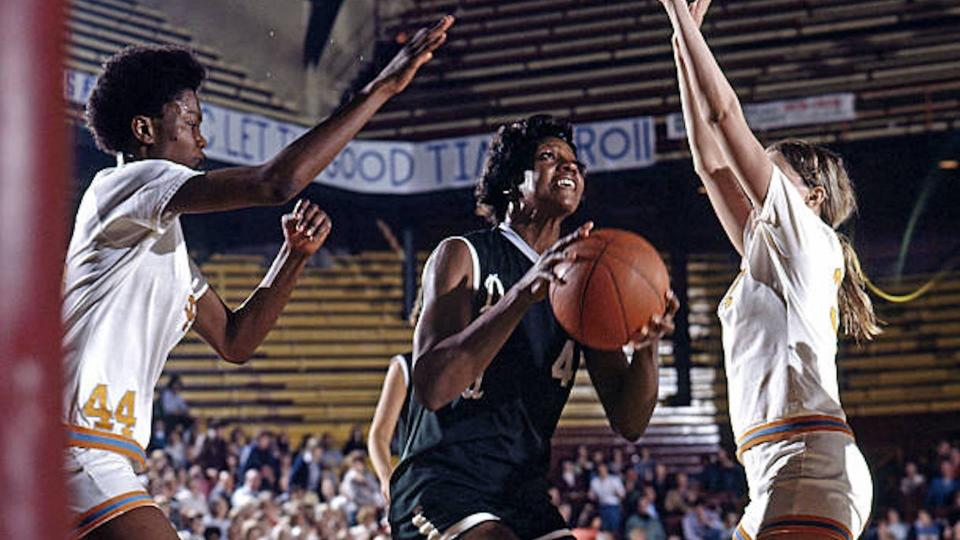
The call had come to Harris' Mississippi home on a sunny day in June 1977. She was a 22-year-old college graduate. She was a married woman.
Harris' illustrious career in basketball had come to an abrupt end after her three consecutive national titles in college. There was no WNBA, no professional women's teams, nothing for Harris to pursue in the sport she loved.
"I wanted to keep playing but there was no place to go," she said in the documentary. "My high school sweetheart, George, asked me to marry him. I said yes."
But on the phone that June day someone was looking for Lucy Harris. The caller was an executive with the Jazz, telling Harris she had been drafted by the team and that they wanted her to come to training.
"We had already decided to start a family," Harris said in the documentary. "I just thought it was a publicity stunt."
Harris thought she had accomplished everything she needed to, everything a woman in the 1970s could accomplish in basketball. She wouldn't really have a chance against the men.
"I didn't think I was good enough," she said. "Competing against a woman, yes. It's a different story competing against a man. So, I decided not to go.
"I said no to the NBA."
'Best post player that has ever played'
Harris was a 6-3 towering figure at Delta State in Cleveland, Miss., so strong and sturdy no one could defend her.
Debbie Brock was a 4-11 guard who played with Harris. She remembers being on an away trip in a hotel room when Harris started calling her name: "Look Debbie. Look Debbie."
Harris had picked up a pair of Brock's shorts and held them up to her waist. Brock's shorts didn't even cover the width of one of Harris' thighs. The two cracked up.
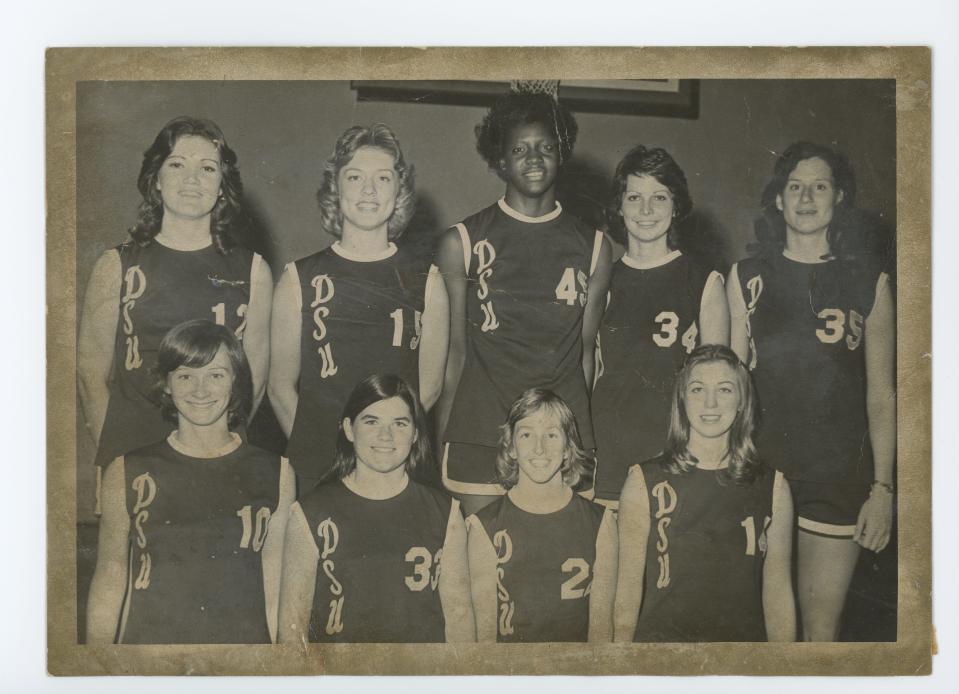
"She had a great sense of humor," Brock said. Otherwise, Harris was quiet, even on the court. And, it seemed, she had no idea just how good she was.
"Her demeanor was just so humble," said Brock. "And even as good a player as she was, and all the awards and everything, she just became more humble."
Brock was a senior in high school when she first saw Harris play. Her parents drove her to watch Delta State, the school she would be attending.
"I never knew. I never really knew what tall was until I saw Lucy," Brock said. "At 6-3, she just dominated the game. That’s who she was."
As Brock and Harris won those three national titles together, the town of Cleveland blanketed the team with support. They traveled all over to follow the women. The home gym they played in held 4,500 and would sell out. The men's Delta State team didn't.
Harris was one major reason why, Brock said.
"She was so physically strong. She could out-rebound everybody," Brock said. "I'm sure she was the best post player that has ever played the game."
During that championship run, Delta State coach Margaret Wade had three key plays. They all ended with Harris scoring. Usually it was the point guard bringing the ball up the court, passing to a player on the perimeter who passed inside to Harris. Who scored with a short jump shot or layup.
"That’s the way it was," said Brock. "We did what we did and you just had to stop us. Not many did."
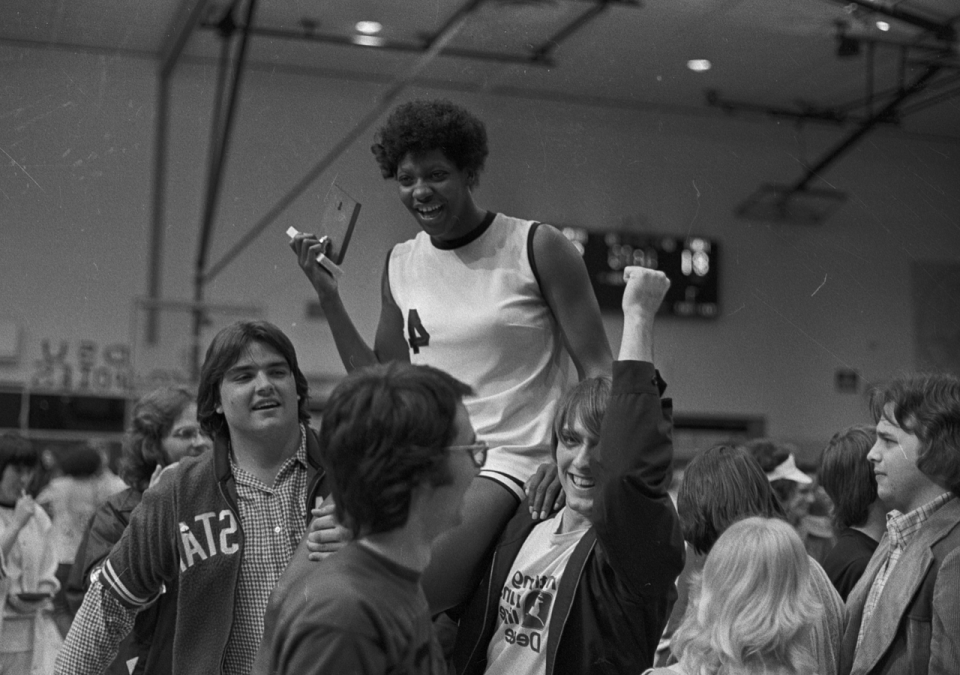
Seventeen days before Harris' death, Brock talked to Harris. She had called to wish Brock a happy new year.
When Brock learned Harris had died Jan. 18, she started thinking back to another phone call, when Brock asked Harris to be the presenter at her Women's Basketball Hall of Fame induction in Knoxville, Tenn., in 2017
"She said, 'I'd be honored,'" Brock said. "I almost started crying when she said that. Here she is who she is. She was just so special and kind."
'Long and tall and that's all'
Harris was born Feb. 10, 1955, in Minter City, a small town in south Mississippi. She was the second youngest in a family of 11.
When she started high school at Amanda Elzy in Greenwood, Miss., she was taller than everybody else in her class, including the boys.
"They would tease me, 'Long and tall and that's all,'" she said in the documentary.
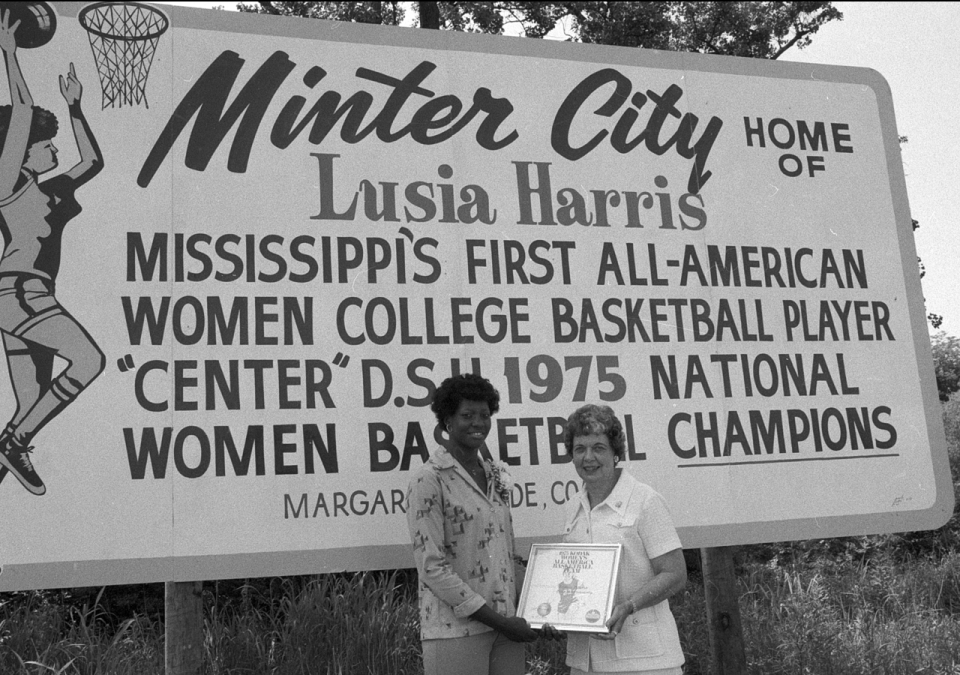
Harris made the girls' basketball team, and though she hadn't had any real coaching , she picked the game up quickly. It came naturally to her.
In one high school game, Harris scored 40 points. The opponent's entire team didn't score 40 points.
When she graduated high school in 1973, it was one year after Title IX had passed. Delta State had started a women's basketball program. Harris had planned to go to Alcorn State, an all-Black school, but it didn't have a women's basketball program.
She changed her mind.
Harris was the only Black player on the Delta State team, but said "once we got on the floor you couldn't tell."
It was a magical time for Harris. She flew on her first plane as a player at Delta State. And she soared as the star player.
'Queen Lucy, just another superstar'
Delta State went undefeated Harris' sophomore season, the only undefeated team that year for men's or women's basketball.
The team was 27-0 as it headed into the championship game against Immaculata, a private Catholic University in Pennsylvania. Immaculata was the 3-time defending national champions of the AIAW, the Association for Intercollegiate Athletics for Women. The NCAA didn't have a women's basketball tournament until 1982.
Inside the arena that night, Harris led her team to a 90-81 victory. The game was televised nationally and newspapers started writing about Harris.
"Delta State's meteoric rise shakes basketball world."
"Queen Lucy, just another superstar."
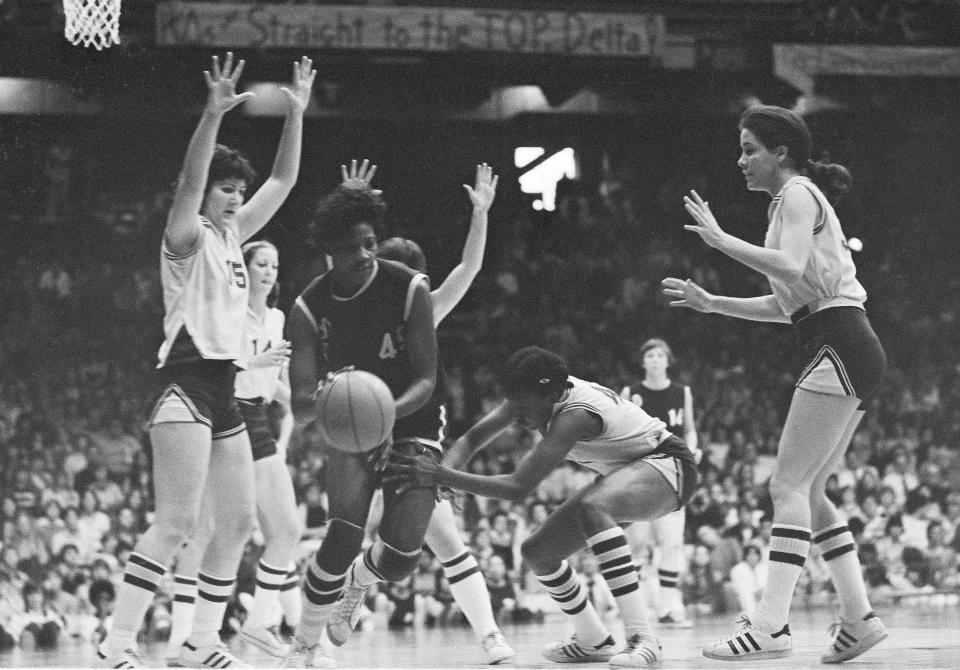
"Oh, she was dominant," said Marianne Stanley, who played against Harris for Immaculata. "She was a physical, skilled player. She was just impossible to guard one on one."
For her career, Harris had an unheard of 60% shooting average from the field. By the time she left Delta State, she had given them three straight titles, averaged 25.9 points and 14.4 rebounds. The team's record was 109-6 during her time there. She’s still the school’s all-time leader in scoring (2,981 points) and rebounding (1,662).
"Before Lucy, you didn't even know Delta State existed," said Stanley, now coach of the Indiana Fever. "But as great of a player as she was, and she was a generational player, she was just as nice of a person."
'We all missed out on knowing Lucy'
Lin Dunn was coaching Ole Miss during Harris' playing days at Delta State. Dunn watched Harris play her senior season at Delta State when she took her third national title.
"She absolutely was one of the most dominant players for sure of the AIAW time," said Dunn, who had recently been named interim general manager of the Fever. "A lot of our great women's players before the NCAA, like Lucy, were relatively secret. There was no internet, no social media. Very little was written about women sports."
But Harris. People had to learn who she was, said Ben Proudfoot, who makes short documentaries, including a series for the New York Times about people who were almost famous
"If history had gone in a slightly different direction," he said, "then we might know their name."
When a colleague told Proudfoot to Google Lusia Harris' name, he was astonished at all she had accomplished. He made a few phone calls and eventually Harris picked up. He drove to Mississippi to tell her story.
"She was so sweet. She was so soft-spoken in the way that she spoke about her career, which was uncanny because of how dominant she was," he said. "You just kind of shake your head."
"I had a few good years," Harris told Proudfoot.
"I said, 'Lucy, you're one of the greatest athletes of the 20th century."
"The world needs to know about her," he said. "Because of the social constructs of the time, not only did she miss out on what would have been a great career, we all missed out on knowing Lucy until now."
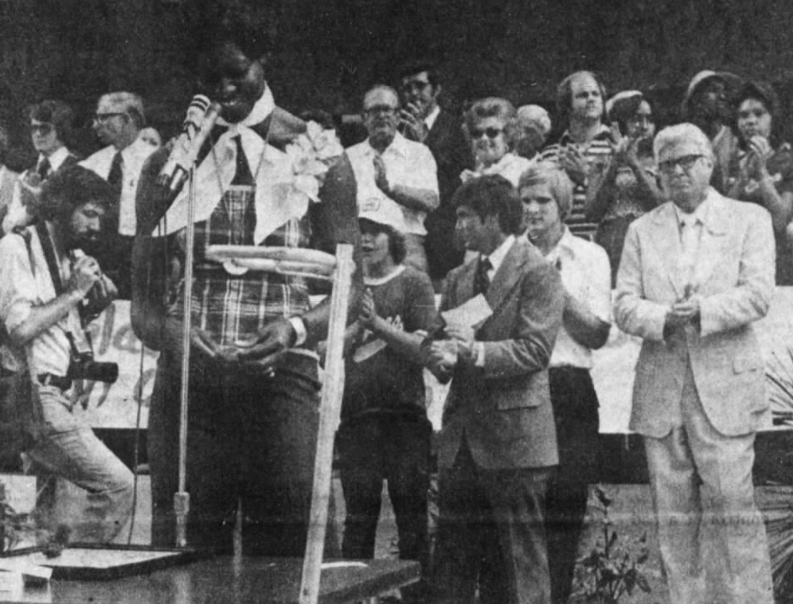
Only one other woman in basketball history has her name associated with the NBA. Denise Long was drafted as a high school senior by the San Francisco (now Golden State) Warriors in 1969. Walter Kennedy, the NBA commissioner, blocked the pick.
That makes Harris the only woman officially drafted in the NBA.
Harris also became the first Black woman enshrined in the Basketball Hall of Fame, in 1992, in Springfield, Mass. Her presenter was Oscar Robertson, the basketball idol whom she used to sneak and watch on those late nights. Harris was enshrined in the Women’s Basketball Hall of Fame in 1999.
Basketball has come a long way since Harris took to the court, but she never looked back and wondered what if.
"Maybe the world would have known my name had I continued playing," she said in the documentary. "But I didn't, so I don't speculate."
Follow IndyStar sports reporter Dana Benbow on Twitter: @DanaBenbow. Reach her via email: dbenbow@indystar.com.
This article originally appeared on Indianapolis Star: Lusia Harris died last month. She was only woman ever drafted by NBA

